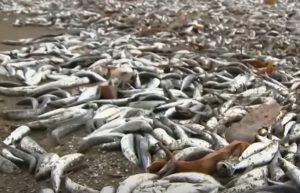thousand tons of fish washed up on the shores of Japan

 Japanese officials have been unable to explain the mass wash of some 1,200 tons of sardines and mackerel ashore in Hakodate, southwest Hokkaido. The incident occurred a week ago, but the cause of the strange environmental incident is still unknown.
Japanese officials have been unable to explain the mass wash of some 1,200 tons of sardines and mackerel ashore in Hakodate, southwest Hokkaido. The incident occurred a week ago, but the cause of the strange environmental incident is still unknown.
The blowout left a half-mile-long shoreline littered with dead fish, and local residents were concerned about the prospect of an incredible stench as the fish began to decompose.
Among the theories put forward by local wildlife experts, the main ones were two: large schools of fish were fleeing from some kind of marine predator and therefore accidentally ended up in shallow water, from where waves washed them ashore, and a drop in water temperature.
Meanwhile, a conspiracy theory was widely circulated on social networks, according to which the fish died due to water from Fukushima, which was allowed to be released into the ocean four months ago.
Japanese authorities claim that this water is completely safe, but few people believe them. The fact is that even experts admit that this water still contains radioactive isotopes of tritium, albeit in very small quantities.
Local fishermen are trying to collect fish that swim in the waves offshore, fearing that rotting fish will reduce the oxygen content in the water, harming marine life.
“I’ve never seen anything like this before. It’s only since last year that we started catching sappu (a local species of sardine) here. It makes me wonder if the marine ecosystem is changing,” says fisherman Mainichi Shimbun, who has worked in the area for 25 years.
“The cause is unknown at the moment. We plan to sample seawater locally and examine it to determine the cause,” Mikine Fujiwara, a local fisheries official, told a local newspaper.
Speculation about the fault of the Fukushima waters has become so popular online that the Japanese Fisheries Agency issued a special message: “No abnormalities were found in the results of water monitoring studies. We are concerned about the dissemination of information that is not based on scientific evidence.”
Meanwhile, Hakodate city officials have urged local residents not to eat beached fish amid reports that some are collecting large quantities of the fish to sell or eat.
“We don’t know for sure under what circumstances the fish washed ashore, so I don’t recommend eating them,” said Takashi Fujioka, a fisheries expert.




